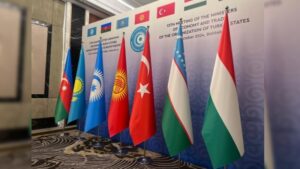President Shavkat Mirziyoyev approved a resolution to accelerate the development of artificial intelligence (AI) technologies in Uzbekistan on October 14, 2024. The strategy, set to guide the country’s AI progress until 2030, was officially adopted by presidential resolution PP No. 358. The Ministry of Justice reports that this plan outlines key goals across various sectors to position Uzbekistan as a leader in AI innovation.

The strategy aims to boost AI-driven software products and services to reach a market value of $1.5bn by 2030. Additionally, the share of government services provided through the national platform is expected to grow to 10%, leveraging AI technology to enhance efficiency and user experience. Another significant target is to establish 10 scientific laboratories dedicated to AI research and development, as well as launch high-performance computing servers to support these efforts. Uzbekistan also aims to enter the top 50 countries on the Government AI Readiness Index by 2030.
To support AI research, a “big data” repository will be created by September 2025, ensuring compliance with information security standards. This database will serve as a crucial resource for AI projects and scientific research. By May 2026, advanced computing infrastructure will be introduced to process data essential for implementing AI technologies.
The Ministry of Digital Development will play a central role in driving AI progress, with the newly established Center for the Development of AI and the Digital Economy tasked with overseeing AI systems and programs. This center will also support startups by providing infrastructure and equity participation. The Reconstruction and Development Fund has committed $50mn, issued as an interest-free loan for five years, to aid the Ministry in realizing these objectives.
AI technologies will be applied across several sectors, including banking, where AI will enhance fraud prevention, solvency assessments, and market forecasting. The Central Bank has been directed to integrate AI into its fraud prevention systems and risk management frameworks.
Other priority areas include tax and customs, where AI will help reduce the shadow economy and forecast suspicious customs activities; healthcare, where AI will assist in diagnostics, treatment selection, and medical image analysis; agriculture, where AI will be used for crop yield forecasting and monitoring livestock, poultry, and fish production; and energy, where AI will optimize energy resource management, support renewable energy development, and improve generation and distribution.




